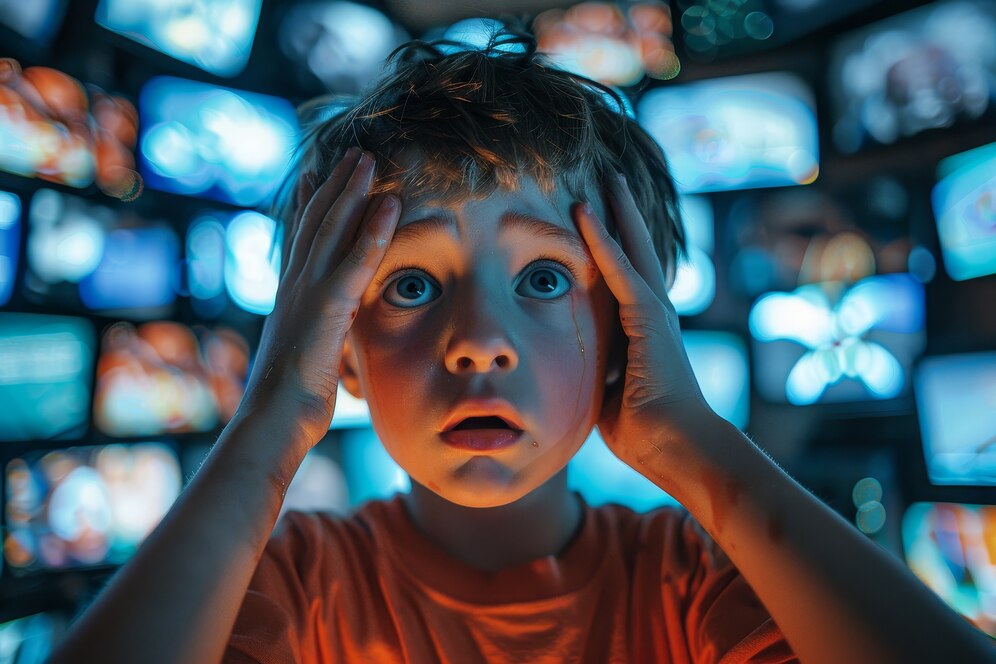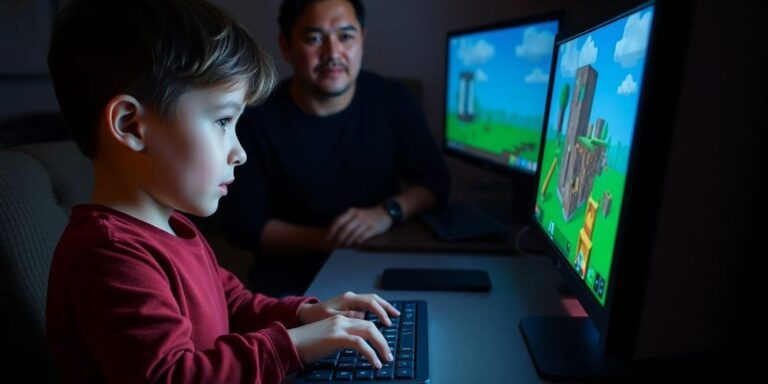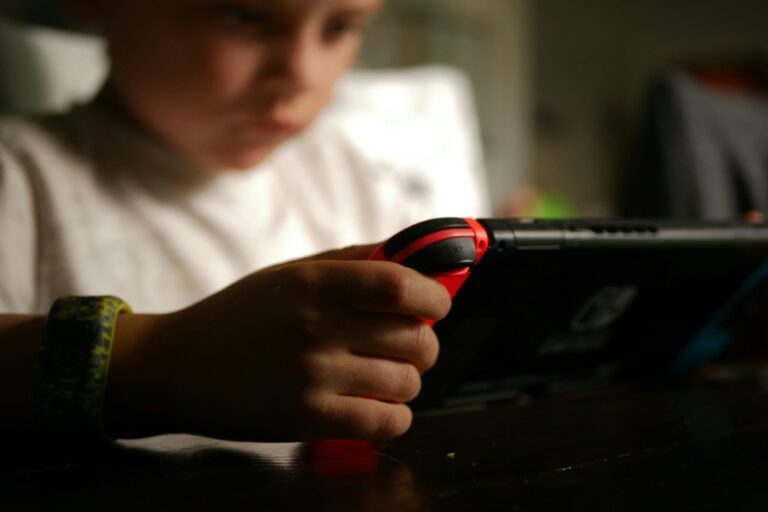
Video games are everywhere. From smartphones and tablets to consoles and PCs, gaming has become a dominant form of entertainment and social interaction for children and adolescents across the globe. This post dives into the science behind gaming addiction brain rewiring in Children, helps you recognize the warning signs, and most importantly, outlines practical strategies parents in Vadodara and everywhere can use to prevent or address this growing issue in 2025.
While gaming can offer fun, challenges, and even learning opportunities, a growing concern haunts many parents: when does a beloved hobby cross the line into addiction? You might notice your child becoming withdrawn, irritable when not playing, neglecting studies, or losing interest in other activities. Is this just a phase, or could it be something more serious – a gaming addiction potentially rewiring their developing brains?
This concern isn’t unfounded. While often dismissed or overlooked, problematic gaming is increasingly recognized by health organizations globally. It’s a ‘silent epidemic’ because its effects aren’t always immediately obvious, yet research suggests excessive gaming can impact brain function, behaviour, and overall well-being.

Gaming: Fun Hobby or Potential Pitfall?
It’s crucial to start by saying: not all gaming is bad. Moderate, age-appropriate video gaming can offer genuine benefits:
- Cognitive Skills: Many games enhance problem-solving, strategic thinking, spatial reasoning, and even hand-eye coordination.
- Social Connection: Online multiplayer games allow kids to connect, collaborate, and compete with friends, fostering teamwork and communication skills.
- Learning & Creativity: Educational games can teach subjects in engaging ways, while sandbox games can stimulate creativity and imagination.
- Stress Relief & Fun: Games provide entertainment, a sense of accomplishment, and a way to unwind.
The problem arises when gaming shifts from a balanced leisure activity to an uncontrolled, compulsive behaviour that dominates a child’s life and causes significant harm.
This is where the concept of “gaming addiction” – clinically termed Internet Gaming Disorder (IGD) by the DSM-5 or Gaming Disorder by the WHO’s ICD-11 – comes into play. It’s defined not just by the amount of time spent gaming, but by the loss of control and the negative consequences experienced.
The Science Bit: Gaming Addiction and Brain Rewiring: Understanding the Impact (PKW H2)
Why can gaming become addictive for some? The answer lies partly in how games interact with the brain’s reward system, especially during the critical developmental years of childhood and adolescence. Here’s a simplified look at the potential neurological impact:
- The Dopamine Loop: Games are expertly designed to be rewarding. Achieving goals, levelling up, getting virtual items – these trigger the release of dopamine, a neurotransmitter associated with pleasure and reinforcement, in the brain’s reward pathway (similar to how substances or other addictive behaviours work). This creates a powerful cycle: play -> feel good -> want to play more.
- Altered Reward Sensitivity: Emerging research, including large-scale studies like the ABCD study in the US, suggests that adolescents developing gaming addiction symptoms may show reduced brain activity in reward areas (like the caudate nucleus) when anticipating other, non-gaming rewards. This ‘blunted response’ could make everyday activities seem less appealing compared to the high stimulation of gaming, reinforcing the desire to play.
- Impact on the Prefrontal Cortex: This brain region, responsible for executive functions like impulse control, decision-making, planning, and emotional regulation, is still developing throughout adolescence. Excessive gaming, particularly the constant stimulation and immediate gratification it provides, might interfere with this development. Some studies suggest links between IGD and alterations in brain areas related to inhibition and executive function, potentially making it harder for affected individuals to control their gaming impulses or make long-term beneficial choices.
- Attention & Cognitive Effects: While some games might improve certain types of attention, excessive gaming or constant media multitasking (switching between games, social media, videos) has been linked in some research to difficulties with sustained attention, increased distractibility, and potentially even structural changes (like reduced white matter integrity or cortical thickness) associated with cognitive functions, although more research is needed.
- Tolerance & Withdrawal: Like other addictions, the brain can adapt. Individuals might need to spend increasing amounts of time gaming to achieve the same level of pleasure (tolerance), and may experience negative feelings like irritability, anxiety, or sadness when unable to play (withdrawal symptoms).
It’s important to note that research is ongoing, and not every child who plays a lot will experience these changes. However, understanding these potential neurological impacts highlights why problematic gaming can be so difficult to manage and why early intervention is crucial.
Recognizing the Red Flags: Signs of Gaming Addiction in Kids & Teens
How can you tell if your child’s gaming has crossed the line from enthusiasm to potential addiction? Look for patterns based on diagnostic criteria used by professionals (DSM-5 / ICD-11). Several of these signs persisting over time (often 12 months, but can be shorter if severe) and causing significant problems are cause for concern:
- Preoccupation: Constantly thinking about gaming, planning the next session, or reliving past gaming experiences. Gaming dominates their thoughts.
- Withdrawal Symptoms: Feeling irritable, anxious, sad, or restless when unable to game or when gaming time is reduced.
- Tolerance: Needing to spend increasing amounts of time gaming to feel satisfied, or playing increasingly intense games.
- Loss of Control: Unsuccessful attempts to cut down or stop gaming, playing for longer than intended frequently.
- Loss of Interest in Other Activities: Giving up or losing interest in previously enjoyed hobbies, sports, or social activities in favour of gaming.
- Continued Use Despite Problems: Persisting with excessive gaming even when aware it’s causing negative consequences (e.g., falling grades, arguments with family, sleep deprivation, health issues).
- Deception: Lying to family members or others about the amount of time spent gaming or the extent of their involvement.
- Escape/Mood Regulation: Using gaming primarily to escape from or relieve negative moods (e.g., stress, anxiety, sadness, guilt, boredom).
- Jeopardizing/Losing Opportunities: Risking or losing significant relationships, educational opportunities, or career prospects due to gaming.
Key Distinction: A child who loves gaming but can easily stop, maintains other interests, and isn’t suffering negative consequences is likely just an enthusiast. Addiction involves a pattern of these behaviours leading to significant impairment in daily life.
Beyond the Brain: Other Consequences of Gaming Addiction
The impact of gaming addiction isn’t limited to brain function. It can ripple outwards, affecting various aspects of a child’s life:
- Physical Health: Neglecting sleep to game late into the night, poor nutrition (skipping meals or eating unhealthy snacks while playing), lack of physical activity leading to sedentary lifestyle issues (weight gain, posture problems), eye strain, repetitive strain injuries (hands/wrists).
- Mental Health: Increased risk or worsening of anxiety, depression, social anxiety, ADHD symptoms, low self-esteem, and irritability.
- Social Life: Withdrawing from real-world friendships and family interactions, preferring online connections within the game, leading to social isolation.
- Academic/Occupational Performance: Falling grades, incomplete homework, skipping school or work, inability to concentrate on studies or job tasks due to preoccupation with gaming.
- Financial Issues (Older Teens/Adults): Spending excessive amounts of money on games, in-game purchases, or gaming equipment.
These consequences highlight why addressing problematic gaming early is vital for a child’s overall development and well-being.
What Parents Can Do: Strategies for Prevention & Intervention (2025)
Whether you want to prevent problems or address existing concerns about your child’s gaming habits, proactive parental involvement is key. Here are strategies applicable for families in Vadodara and across India:
- Open Communication: Talk regularly and calmly about gaming. Show genuine interest in the games they enjoy, but also express your concerns non-judgmentally. Understand why they play – is it for fun, social connection, escape, or achievement?
- Set Clear & Consistent Boundaries:
- Establish agreed-upon time limits for gaming (referencing age-appropriate guidelines like AAP’s can help). Factor in homework and other responsibilities first.
- Define when and where gaming is allowed (e.g., not during meals, not in bedrooms overnight).
- Use tools like family media plans (ChildNet, Common Sense Media offer templates) and potentially parental control apps/features on devices/routers if needed.
- Consistency is vital. Follow through on agreed consequences if boundaries are broken.
- Encourage Diverse Activities: Actively help your child find and engage in offline hobbies, sports, creative pursuits, clubs, or social activities they enjoy. Balance screen time with ‘green time’ and face-to-face interaction.
- Model Healthy Tech Habits: Children learn by example. Be mindful of your own screen time and device usage. Establish tech-free times or zones for the whole family.
- Monitor Content & Interactions: Be aware of the games your child plays (check PEGI/ESRB ratings). Understand the social dynamics if they play online multiplayer games. Talk about online safety and respectful communication.
- Prioritize Health & Well-being: Ensure your child gets adequate sleep (crucial for developing brains!), eats nutritious meals, and engages in regular physical activity. These build resilience.
- Address Underlying Issues: If you suspect excessive gaming is a symptom of underlying anxiety, depression, ADHD, low self-esteem, or social difficulties, address those root causes, potentially with professional help.
- Seek Professional Help When Needed: If gaming is causing significant problems and you’re struggling to manage it, don’t hesitate to seek help. Consult your pediatrician, a child psychologist, a family counselor, or an addiction specialist. In India, resources are growing:
- SHUT Clinic (Service for Healthy Use of Technology) at NIMHANS, Bangalore: A pioneering clinic for technology addictions.
- Local Mental Health Professionals: Search for child psychologists or psychiatrists in Vadodara or your city who specialize in behavioral addictions or adolescent mental health.
- Rehabilitation Centers: Some centers, like Alpha Healing Center in Vadodara (as listed on Recovery.com), may offer programs addressing process addictions including gaming. Research specific services offered.
- School Counselors: Can be a valuable first point of contact.
Parental Role: Be involved, informed, and proactive. Focus on balance, communication, and setting healthy boundaries.
Conclusion: Nurturing Healthy Habits in a Digital World
The allure of video games is undeniable, offering excitement, connection, and challenge. While moderate gaming can be a positive part of childhood, the potential for gaming addiction – a condition with real neurological and behavioral consequences – is a valid concern for parents in Vadodara, India, and globally in 2025. Understanding how excessive gaming can impact the developing brain’s reward pathways, decision-making centers, and attention networks underscores the importance of proactive engagement.
Recognizing the warning signs and implementing consistent strategies focused on communication, clear boundaries, promoting balance, and prioritizing overall well-being can help prevent problems or address them effectively. Remember, the goal isn’t necessarily to eliminate gaming, but to ensure it remains a balanced part of a rich and varied life. If concerns persist, seeking professional guidance is a sign of strength.
By staying informed and involved, parents can help their children navigate the digital world healthily and thrive both online and offline.
Take one positive step today. Sit down with your child (at a calm time) and have an open conversation about their gaming – what they enjoy, how much time they think is fair. Consider collaboratively creating a Family Media Plan using online templates. Open communication is the first step towards balance.
Frequently Asked Questions (FAQ)
- How much gaming time is considered ‘too much’ or indicative of gaming addiction?
There’s no universal ‘magic number’ of hours. Addiction is defined by the impact on functioning, not just time spent. However, guidelines exist: the American Academy of Pediatrics suggests limiting screen entertainment to about 1 hour/day on school days and 2 hours/day on non-school days for children over 6, ensuring it doesn’t interfere with sleep, physical activity, homework, or family time. If gaming consistently takes precedence over these essential activities and causes negative consequences (loss of control, withdrawal, neglected responsibilities), even fewer hours could be problematic for that individual. - Is online multiplayer gaming addiction different or worse than offline single-player addiction?
Both online and offline gaming can become addictive. However, online multiplayer games often have features that can increase addictive potential:
* Social Connection/Obligation: Playing with friends creates social pressure to be online.
* Constant Updates/Events: Keeps players hooked with new content and rewards.
* Competitive Elements: Leaderboards and rankings fuel a drive to play more.
* Unpredictable Rewards (Loot Boxes etc.): Can trigger dopamine strongly, similar to gambling mechanics. The core mechanisms (reward pathway, loss of control) are similar, but the specific triggers and social dynamics can differ. - What specific professional help is available for gaming addiction in India, particularly near Vadodara?
Resources are growing but may require searching:
* Mental Health Professionals: Look for child/adolescent psychologists, psychiatrists, or counselors in Vadodara with experience in behavioral addictions or technology overuse. Online therapy platforms may also offer specialists.
* Specialized Clinics: NIMHANS in Bangalore has a SHUT clinic. Check major hospitals or psychiatric departments in Gujarat for similar initiatives.
* Rehabilitation Centers: Some private centers treat process addictions. Search results indicate Alpha Healing Center in Vadodara treats substance use and mental health and might address gaming issues – contact them directly to inquire about specific programs.
* School Counselors: Often a good starting point for assessment and referral.
* Helplines: While dedicated gaming addiction helplines might be limited nationally, general mental health helplines (like Vandrevala Foundation, Kiran Helpline) can offer initial support and guidance. - My child says gaming helps them relax and cope with stress. Is this a sign of addiction?
Using gaming occasionally to unwind or destress isn’t necessarily problematic. However, if gaming becomes the primary or only way your child copes with negative emotions (stress, anxiety, sadness, boredom) and they struggle to manage these feelings without gaming, it becomes a red flag for using games as an escape mechanism, which is one criterion for Gaming Disorder. Healthy coping involves a range of strategies, not just reliance on one activity. - Can children ‘outgrow’ gaming addiction on their own?
While some patterns of heavy gaming might decrease as interests change or responsibilities increase, clinical Gaming Disorder often requires intervention. The brain changes associated with addiction can make it very difficult to regain control without support. Relying on a child to simply ‘outgrow’ a pattern causing significant impairment is risky. Early intervention through parental strategies and professional help (if needed) offers the best chance for positive change.






